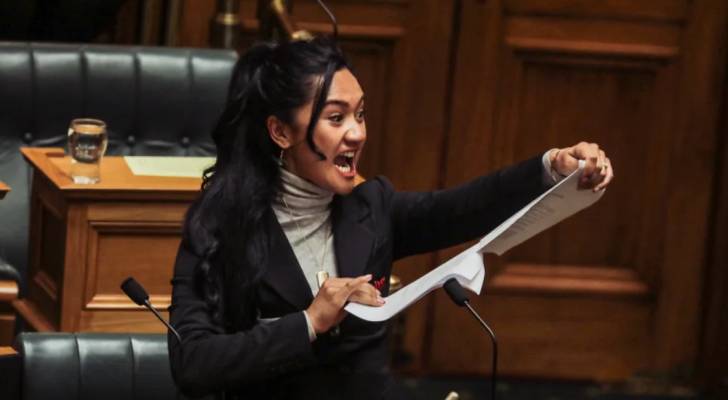Hana-Rawhiti Maipi-Clarke performing the haka in protest of a bill (Credit: RNZ)
Three Māori MPs suspended from New Zealand Parliament over haka protest
New Zealand’s Parliament has imposed suspensions on three Māori lawmakers following a protest haka during a legislative session last year.
Opposition MP Hana-Rawhiti Maipi-Clarke was suspended for seven sitting days, while her Te Pāti Māori co-leaders, Rawiri Waititi and Debbie Ngarewa-Packer, were barred from participating in parliamentary proceedings for 21 days. The penalties stem from a haka the trio performed in protest against the controversial Treaty Principles Bill during its first reading in November.
The bill, which has since been rejected by Parliament, aimed to redefine the principles of the Treaty of Waitangi — New Zealand’s founding agreement between the British Crown and Māori chiefs, signed in 1840. The proposal triggered nationwide backlash and drew tens of thousands of demonstrators to the steps of Parliament, making it one of the largest protests in recent history.
Read more: New Zealand Māori MPs face suspension over haka protest in parliament
“We have been punished for being Māori,” Ngarewa-Packer told the BBC, condemning the suspensions. “We take on the stance of being unapologetically Māori and prioritising what our people need or expect from us.”
Maipi-Clarke, the youngest MP at age 22, became emotional during Thursday’s heated session. “We will never be silenced, and we will never be lost,” she said, holding back tears. “Are our voices too loud for this house – is that why we are being punished?”
The suspensions are the longest ever handed down in New Zealand’s parliamentary history — the previous record stood at just three days. The decision follows a recommendation from a parliamentary committee last month, which argued the haka disrupted proceedings and may have “intimidated” other MPs.
Prime Minister Christopher Luxon has pushed back against claims that the move was racially motivated. “This is not about haka,” he said at the time. “It’s about parties not following the rules of Parliament.”
Still, tensions between the government and the Māori community have been rising. Critics of the Luxon-led conservative coalition accuse it of scaling back support for Māori initiatives, including plans to dismantle a health body focused on improving outcomes for indigenous populations.
Luxon has defended his administration’s record, pointing to investments in education and housing as evidence of his government’s commitment to Māori wellbeing.
The Treaty Principles Bill, introduced by the right-wing ACT Party, was the flashpoint that ignited the current unrest. Proponents argued the Treaty has led to racial division and requires reinterpretation in a modern, multicultural context. Opponents warned the bill would erode hard-won protections for Māori and set back efforts toward equity and reconciliation.
Read more: VIDEO: Youngest MP leads Haka protest against New Zealand treaty bill
The public outcry culminated in a nine-day hīkoi, a traditional protest march, which began in New Zealand’s far north and ended in Wellington. By its conclusion, more than 40,000 people had joined.
Parliament ultimately rejected the bill in April by an overwhelming margin of 112 to 11. Te Pāti Māori, which holds six of the 123 seats in the House, has vowed to continue challenging what it sees as attempts to undermine indigenous rights.




